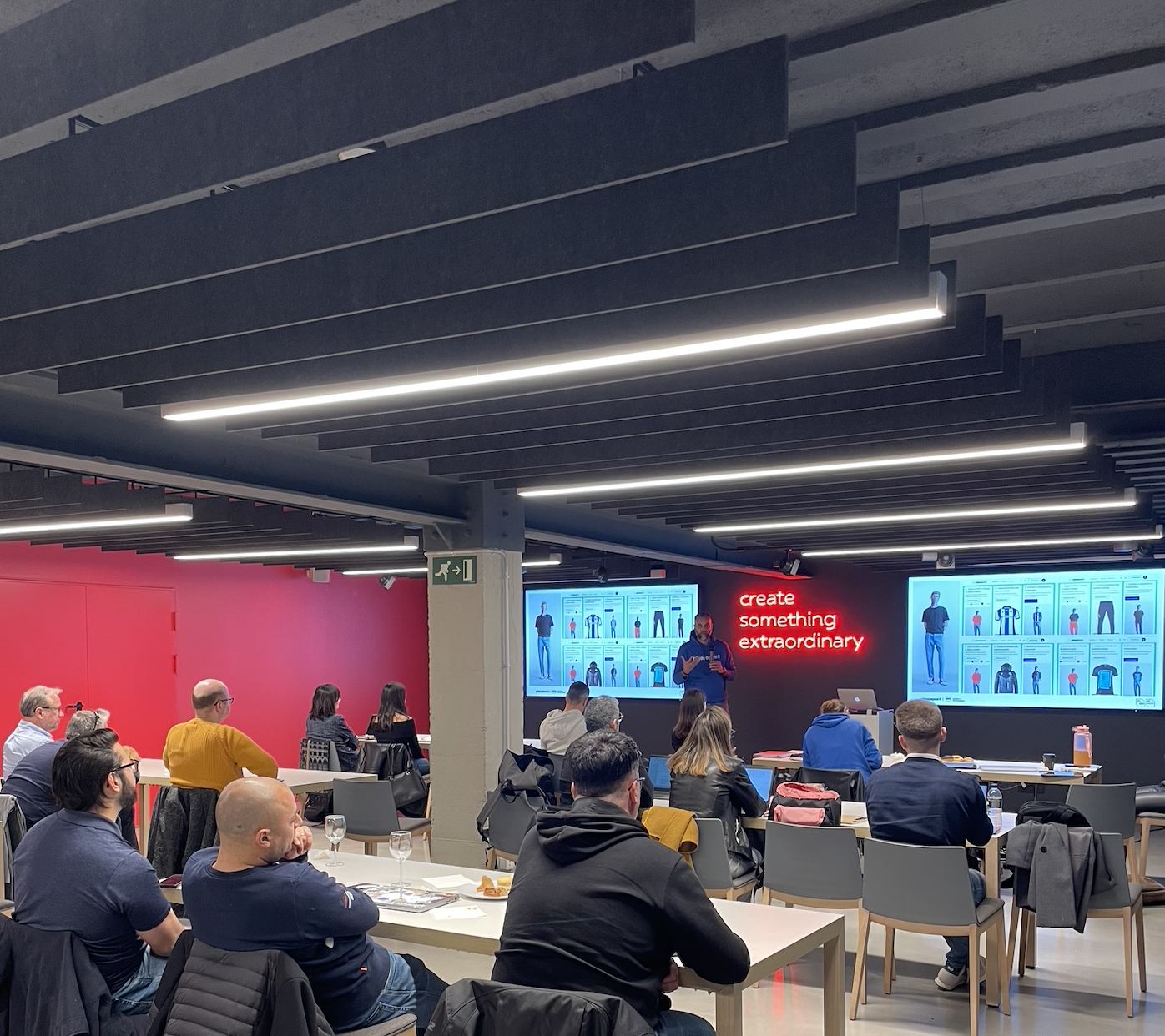
5 use cases of Pleasepoint’s artificial intelligence applied in eCommerce
In this post, we explore five AI use cases from Pleasepoint to show you how one-to-one personalization transforms interactions in your eCommerce.
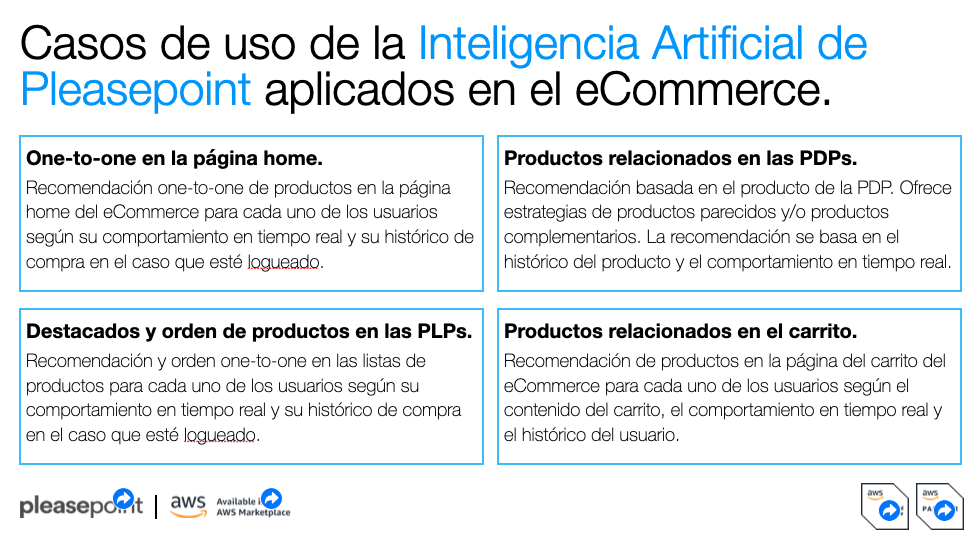
Personalization in eCommerce is crucial to improving the user experience and increasing conversions. Pleasepoint's artificial intelligence enables highly effective one-to-one recommendation strategies, adapting to each user's individual preferences and behaviors.
If you want to see a specific success story on the results of one-to-one personalization with Pleasepoint, here is the link to the Success story: One-to-one personalization with Condis customers.
In this post, we explore five use cases of Pleasepoint's AI to show you how one-to-one personalization transforms interactions in your eCommerce. These are the topics we will cover:
- One-to-one on the home page.
- Related products on PDPs.
- One-to-one featured products on PLPs.
- One-to-one sorting on PLPs.
- Related products on the cart page.
- Conclusion.
In the last post, we shared the benefits of one-to-one personalization (34 times more effective on average) during the real-time shopping experience in eCommerce, compared to traditional strategies of showing best-selling or trending products from recent days or hours.
If you’re interested in understanding how to implement one-to-one personalization in your eCommerce, here’s the link to the Technical guide to one-to-one personalization in your eCommerce with the Pleasepoint SDK.
1. One-to-one on the home page.
The home page of an eCommerce is the entry point for many users. Implementing one-to-one recommendations on the home page allows you to personalize the experience from the first interaction.
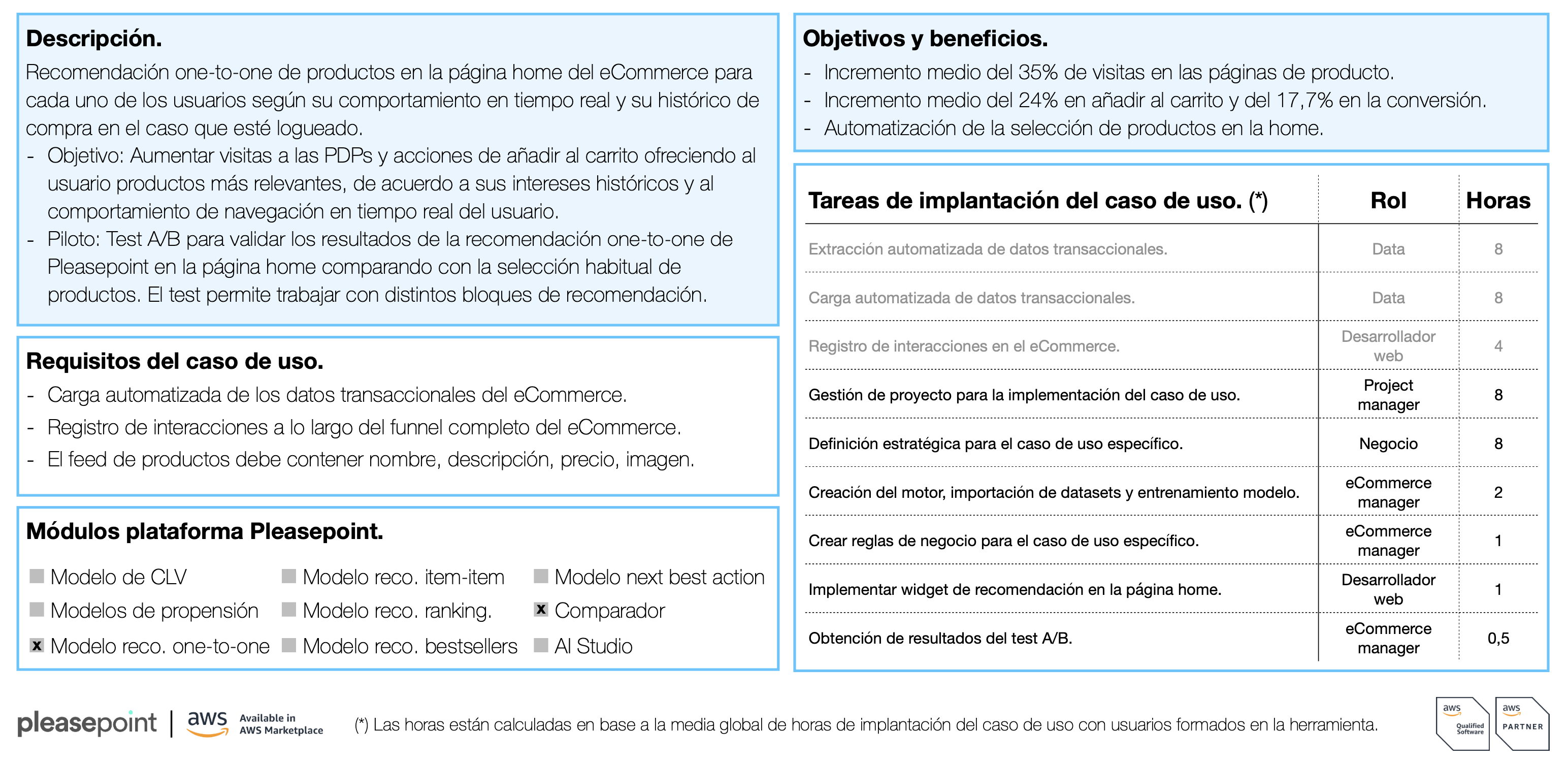
Objective: Increase visits to product detail pages (PDPs) and add-to-cart actions by offering more relevant products based on real-time behavior and the user’s purchase history if they are logged in.
Pilot: An A/B test is conducted to compare the results of Pleasepoint's one-to-one recommendation with the usual selection of products on the home page. The test may include different recommendation blocks to assess effectiveness.
Results and benefits:
- Average 35% increase in visits to product pages.
- Average 24% increase in add-to-cart actions.
- Average 17.7% increase in conversion.
- Automation of product selection on the home page, reducing manual workload.
If you’re interested in implementing this use case, here’s the link to schedule a session with our eCommerce specialists.
2. Related products on PDPs.
Showing related products on product detail pages (PDPs) is an effective strategy to increase user interaction and cross-sales.
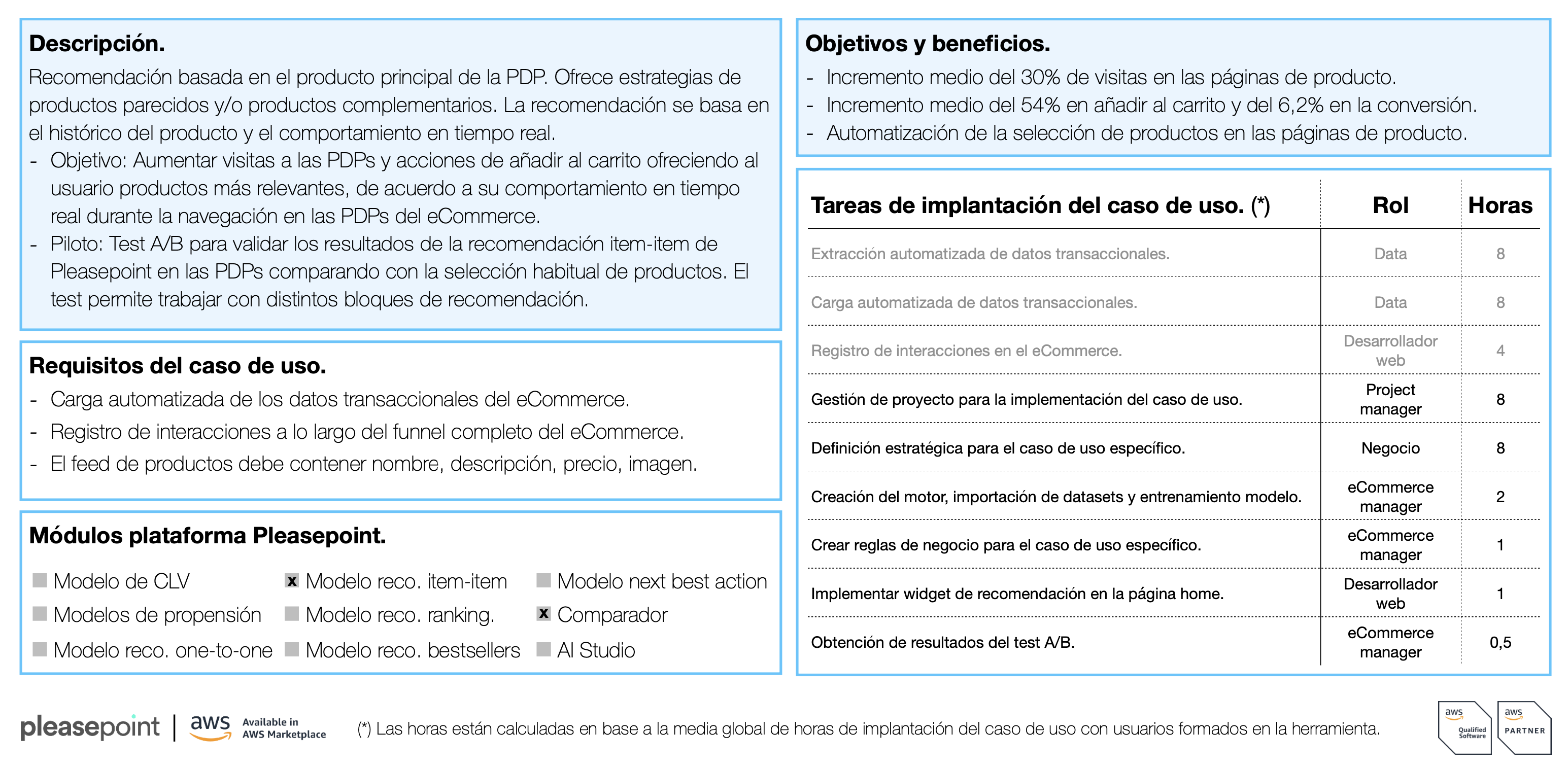
Objective: Increase visits to other PDPs and add-to-cart actions by offering similar and/or complementary products based on the main product and the user's real-time behavior.
Pilot: An A/B test is conducted to validate the results of Pleasepoint's item-to-item recommendation on PDPs, compared to the usual selection of related products.
Results and benefits:
- Average 30% increase in visits to product pages.
- Average 54% increase in add-to-cart actions.
- Average 6.2% increase in conversion.
- Automation of related product selection, optimizing relevance and user experience.
Want to implement this use case? Here’s the link to schedule a session with our eCommerce specialists.
3. One-to-one featured products on PLPs.
Product listing pages (PLPs) can greatly benefit from one-to-one personalization, highlighting relevant products for each user.
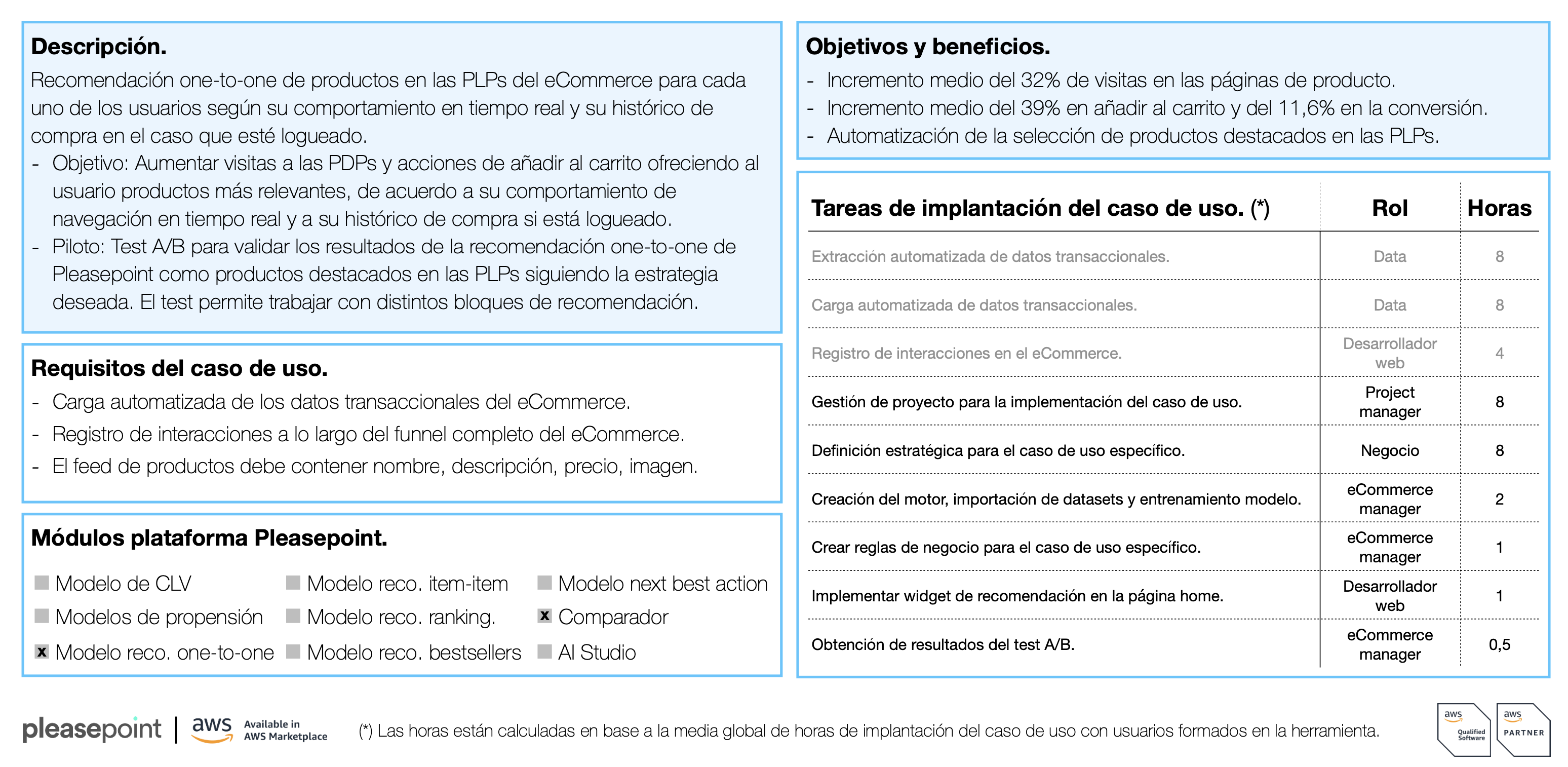
Objective: Increase visits to PDPs and add-to-cart actions by offering personalized featured products based on real-time behavior and the user’s purchase history, if they are logged in.
Pilot: An A/B test is conducted to validate the results of Pleasepoint's one-to-one recommendation as featured products on PLPs.
Results and benefits:
- Average 32% increase in visits to product pages.
- Average 39% increase in add-to-cart actions.
- Average 11.6% increase in conversion.
- Automation of featured product selection on PLPs, improving relevance and efficiency.
Implement this use case with the support of our eCommerce specialists.
4. One-to-one sorting on PLPs.
Personalized product sorting on PLPs can significantly enhance the user experience and increase conversions.
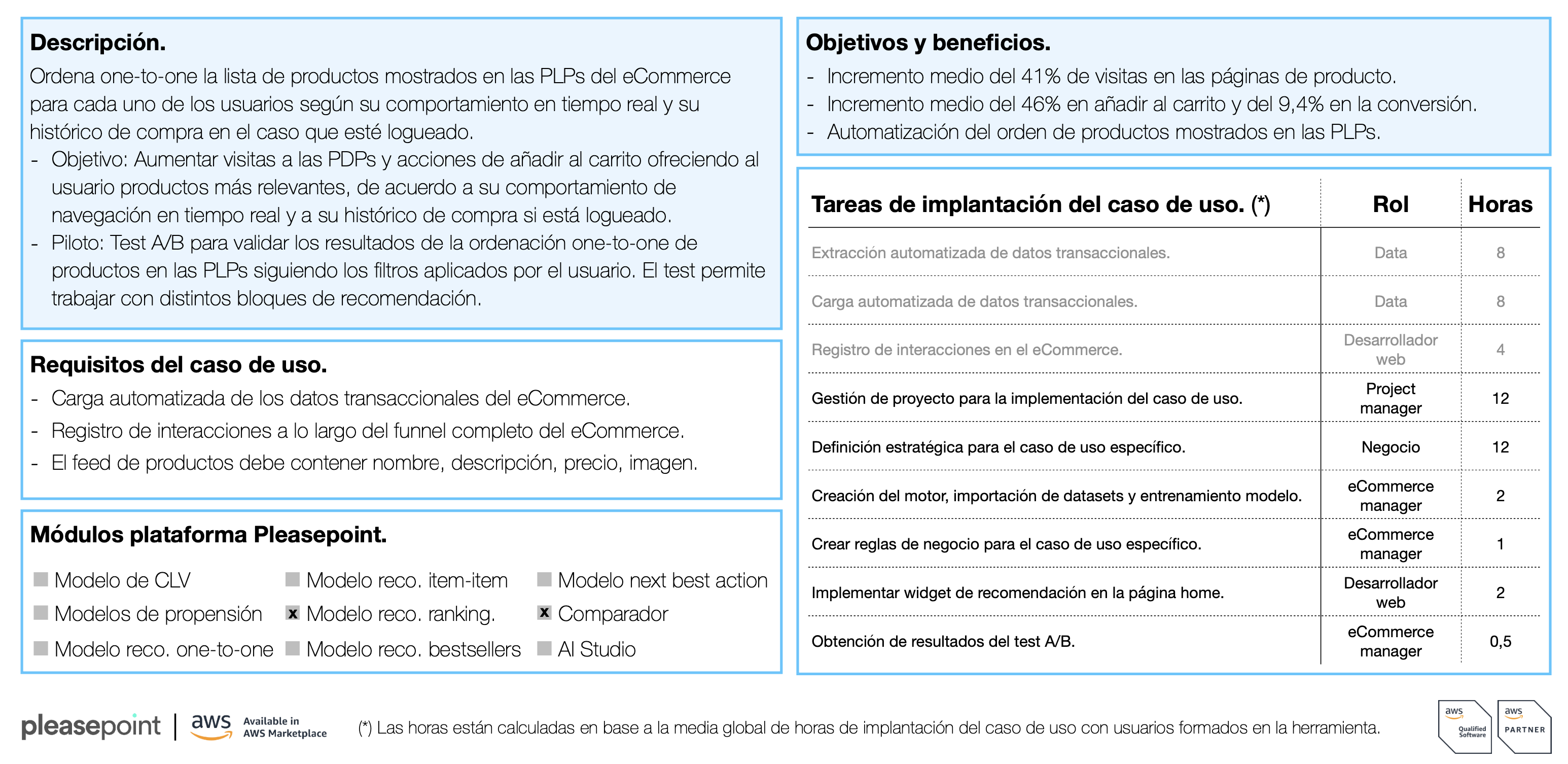
Objective: Increase visits to PDPs and add-to-cart actions by offering products sorted in a relevant manner based on real-time behavior and the user’s purchase history, if they are logged in.
Pilot: An A/B test is conducted to validate the results of one-to-one product sorting on PLPs, considering filters applied by the user.
Results and benefits:
- Average 41% increase in visits to product pages.
- Average 46% increase in add-to-cart actions.
- Average 9.4% increase in conversion.
- Automation of product sorting on PLPs, adapting to user preferences.
Start implementing one-to-one personalization now by scheduling a session with our eCommerce specialists.
5. Related products on the cart page.
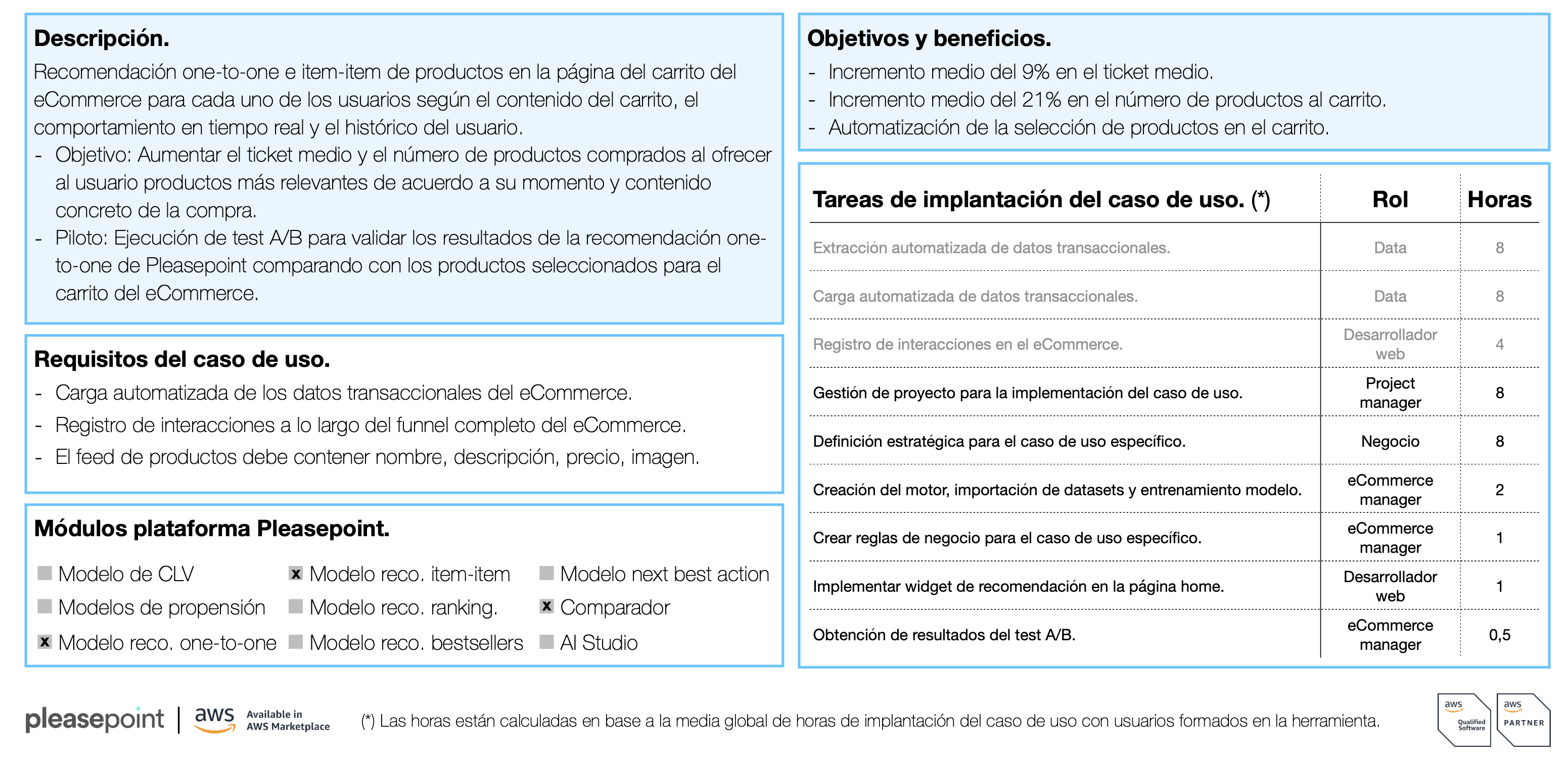
The cart page is a critical point in the purchase process. Offering related products can increase the average ticket size and the number of items purchased.
Objective: Increase average ticket size and the number of products purchased by offering relevant products based on cart content, real-time behavior, and user history.
Pilot: An A/B test is conducted to validate the results of Pleasepoint's one-to-one recommendation compared to the products selected for the cart by the eCommerce.
Results and benefits:
- Average 9% increase in average ticket size.
- Average 21% increase in the number of products added to the cart.
- Automation of product selection in the cart, improving relevance and facilitating purchase decisions.
Here’s the link to schedule a session with our eCommerce specialists and start implementing this use case.
Conclusion.
Implementing one-to-one user experience personalization with Pleasepoint’s artificial intelligence across different eCommerce pages has a significant impact on user interaction and key business KPIs.
From the home page to the cart, personalization based on a reinforcement learning neural network improves the relevance of displayed products, increases visits to product pages, add-to-cart actions, and ultimately, sales conversions.
Automating product selection and sorting not only optimizes the user experience but also reduces manual workload, allowing marketing teams to focus on higher-value, less repetitive tasks.
With Pleasepoint, real-time personalization becomes a powerful tool for any eCommerce looking to stand out in a competitive market and foster long-term customer loyalty.
Download our eBook Introduction to one-to-one marketing and learn how to execute a hyper-personalized strategy based on each customer's lifecycle and preferences. It's never been easier to start hyper-personalizing and increasing the performance of your marketing efforts.
También te puede interesar...
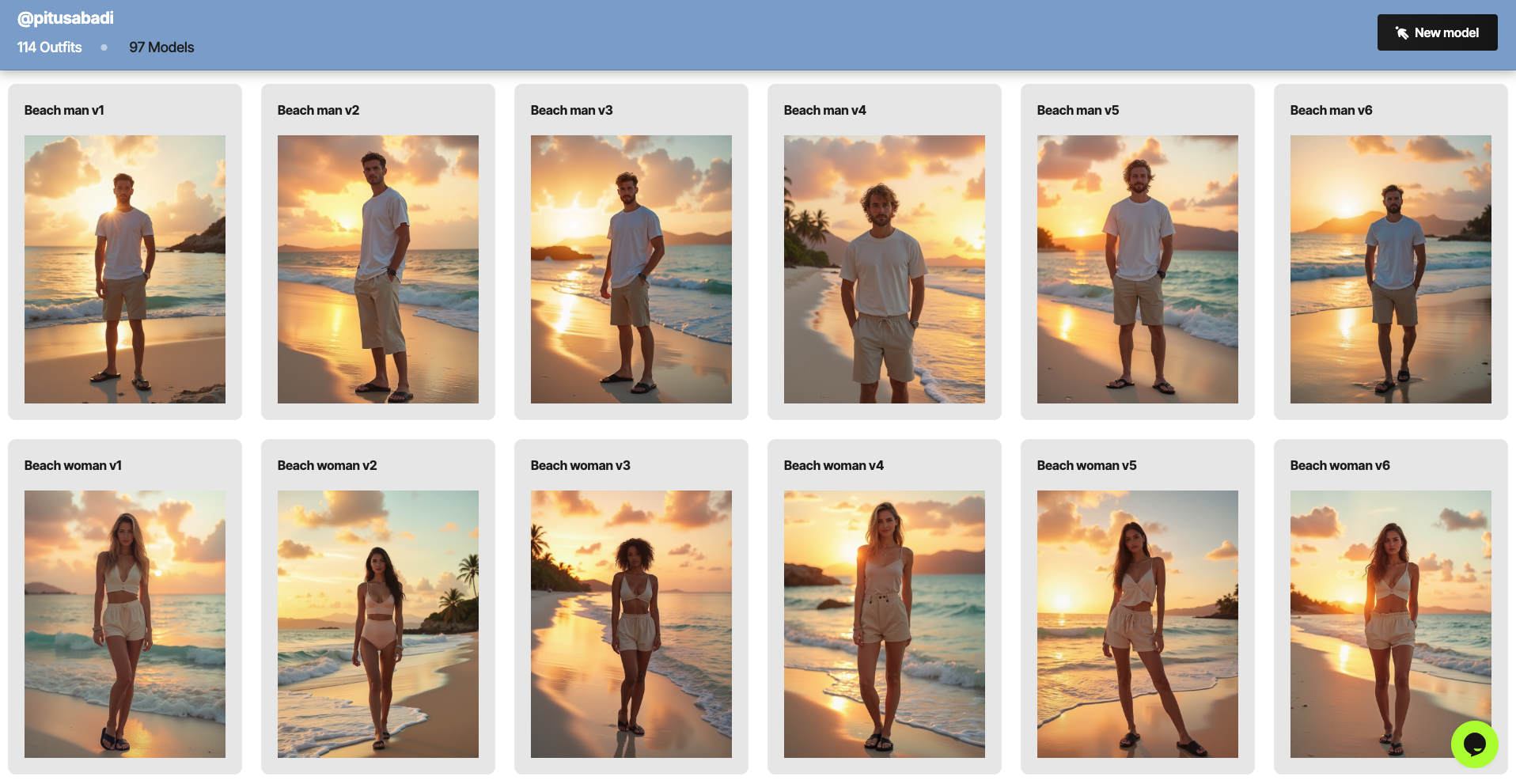
MyOutfits launches 300+ free models for fashion diversity
MyOutfits launches 300+ free models to democratize diversity in fashion.

Success Case: How Norauto personalizes their campaigns.
Norauto is clear: They need a data strategy for their campaigns.
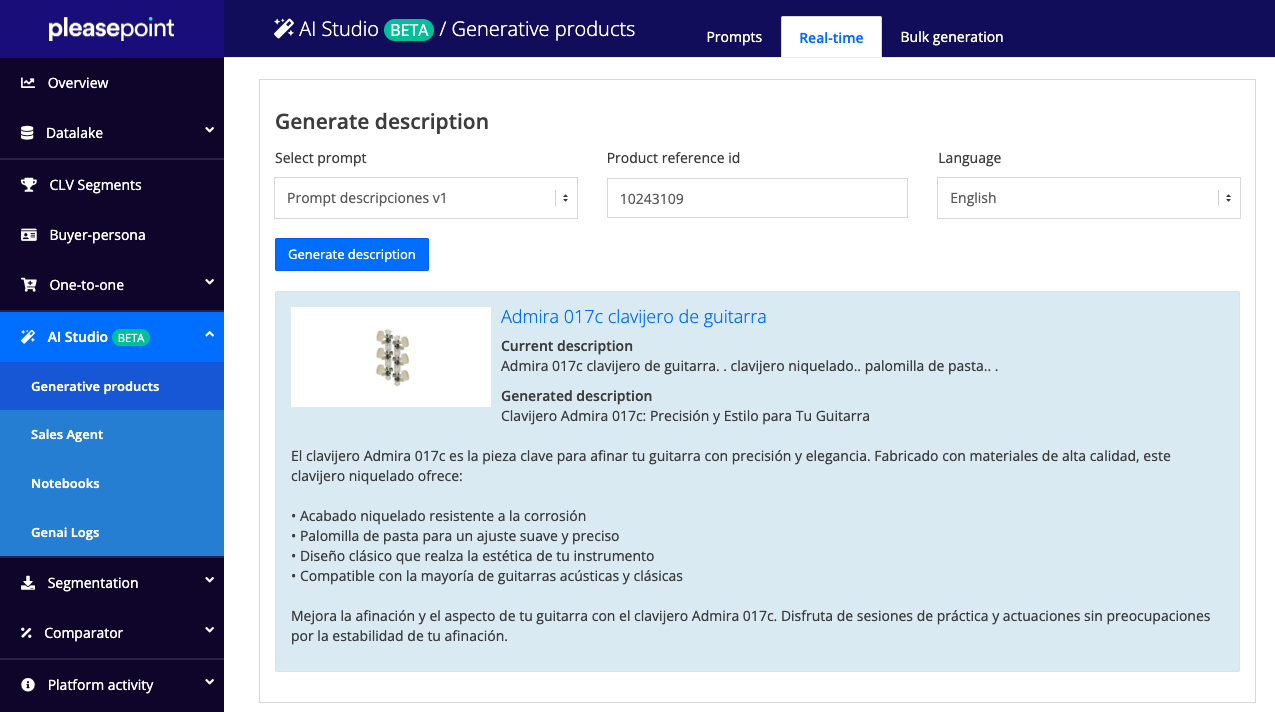
High-Quality Product Descriptions with AI
Automate high-quality product descriptions with AI and multiply your productivity.
Don't miss the upcoming Pleasepoint events!
Join our events and discover the best AI use cases. Learn from experts, participate in live demos, and access success stories that will drive your business.
Amazon Web Services (AWS) Software Partners (ISV).
We are ISV (Independent Software Vendor) partners of Amazon Web Services (AWS) and have been selected for the ISV-Accelerate program.


"With Pleasepoint, we have moved from the traditional campaign management model to a more dynamic, segmented, and enriched customer model, personalizing CRM campaigns and improving the conversion of our e-commerce channel customers."
Josep Jarque
Digital Project Manager & IT Architect"The implementation of one-to-one personalization has allowed us to generate much more interesting content for users, as well as foster loyalty, improve the shopping experience, and generate additional sales through personalized recommendations."
Jose Antonio Linde
COO of Condisline"Throughout all these years of collaboration, we have closely witnessed the growth and evolution of the Pleasepoint platform. With predictive marketing, our results were very satisfactory. With one-to-one personalization, we have been able to enrich the information and design individual actions and offers. As a result, we are achieving greater customer retention and loyalty."
Alberto Elizondo
Digital Transformation at Real Sociedad"Working with Pleasepoint allows us to discover new customer purchasing behaviors, refine the implementation of campaigns based on their shopping journeys, and anticipate customer needs. Thanks to all this, we are improving personalization and enhancing the performance of our campaigns."
Belén Pérez Benavente
Customer Knowledge and Loyalty Manager at Norauto Spain"Pleasepoint has enabled us to take a leap in the analysis and segmentation of our customer base. Thanks to its personalization and predictive capabilities, we can now design more precise and efficient CRM campaigns based on purchasing behavior, optimizing our results, allowing us to innovate and add value."
Manuel Caamaño De Melo
Data Scientist at Norauto Spain"Thanks to Pleasepoint, our digital library is not only more intuitive and efficient, but also allows users to access relevant legal content with unparalleled speed and precision. This has transformed the way our clients interact with legal resources, offering a service that adapts to their needs almost naturally."
Òscar Gallud
CEO of Atelier LibrosOur clients vouch for us.













